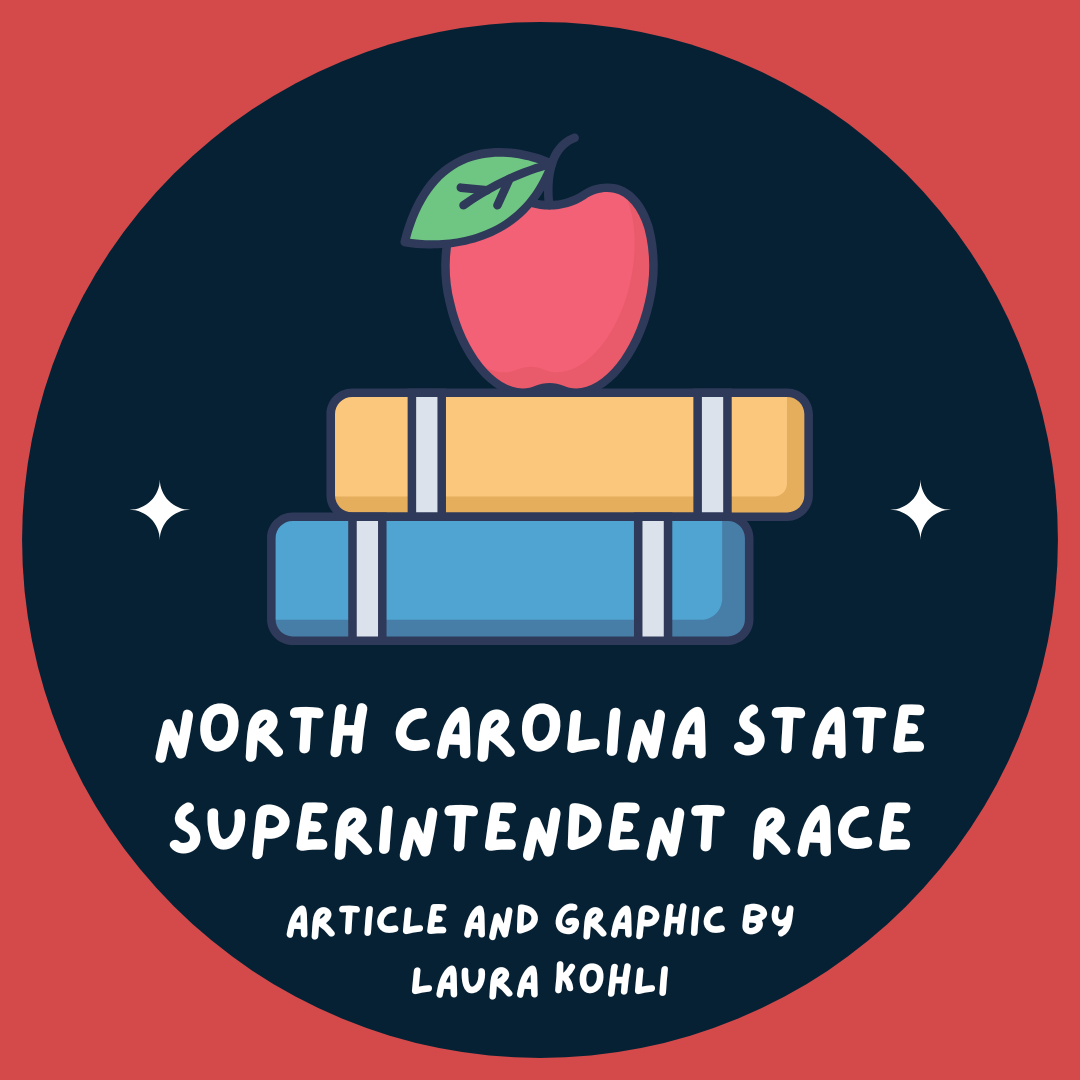On Nov. 5 North Carolinians will cast their ballots for the state superintendent, choosing between Democrat Mo Green and Republican Michelle Morrow.
Polls for the State Superintendent as well as other offices like the presidency will be open from 6:30 a.m. to 7:30 p.m. on Nov. 5. Voting locations for each precinct can be found here. Voters should remember to bring their voter ID and double check their registration.
Both candidates have widely different policy opinions and experience. Mo Green, the Democratic nominee, is a former superintendent of Guilford county where he served for 7 years. Michelle Morrow is a mother who advocates for homeschooling, and who used her rising social media popularity to beat out the incumbent Republican superintendent, Catherine Truitt.
Morrow gained attention through her social media presence, where she, as a homeschool teacher, criticized public schools: notably calling them “indoctrination centers”. Her far right platform is popular among similar bases to former President Trump, often centering around attacks on critical race theory and DEI programs.
One of Morrow’s most prominent planks is her intention to audit the NCDPI, meaning a complete financial examination of the Department of Public Instruction, and to cut public school programs she considers pushing a political agenda on children.
Green’s campaign emphasizes his experience in running a public school district. Coming from a National District of Character, Green advocates for including education on character values and service learning. During his term as Guilford superintendent, Green raised graduation rates, as well as rates of students receiving college credit.
In regards to the teacher shortage, Green promised to increase teacher pay, at least to the national average. He has said he supports better teaching working conditions for teachers as well.
The main pillar of Green’s campaign is respect and investment in public schools. In comparison to Morrow’s attacks and intention to gut public school funding, Green says that funding has not been keeping up with the expansion of the state. He promises to invest in “targeted strategic ways” to raise graduation rates and national prestige.
Green’s campaign has also centered around criticizing Morrow’s far-right beliefs and practices; Green’s campaign has said this race is a fight for the “soul of public education”. As well as denouncing her plans of defunding the public school system and her encouragement of the private school voucher system, which would provide public funding to parents wishing to send their children to private schools, Green has pointed out that Morrow was present at the Jan. 6 riots. Green continues to stress that someone who supports political violence cannot be trusted in a public office. He also often points to 2020 social media comments in which Morrow called for the execution of President Biden as well as former president Obama.
The state superintendent leads the Department of Public Instruction, or the DPI. Although the State Board of Education is the ultimate school policy making body, the DPI makes the standards in which the Board of Education votes on, and DPI oversees implementation of policy.
“North Carolina is a local control state, which means that the various school districts (i.e. Wake County Public Schools System) have great autonomy over the education in their communities. However, DPI provides a number of resources and supports, drafts the standards which the State Board votes on, directs monitoring and compliance for the K-12 public school system, and advocates for legislation” Explains Rupen Fofaria, director of the State Board of Education.
In the wake of an election that will have a direct impact on students, Fofaria encourages young people to get involved in school policy.
“Some decisions that are made about public education affect teachers. Some decisions that are made affect district leadership. Some decisions affect school staff… But every single decision made about public education affects the students, so [however] you get involved I encourage every student to start somewhere.” Says Fofaria.
Fofaria expands on how students can get involved, “…students can attend local school board meetings to watch how leadership conducts business, stay on top of the decisions they are making, and even have their voices heard during public comment period[s]. At the school level, students can practice advocacy, forming well-researched positions on issues facing the school and discussing their positions with teachers and administrators.”
The State Superintendent has immense power to affect students and families lives everywhere, so researching candidates and voting is of the utmost importance.
Fofaria concludes with what he values in a DPI leader: “I think you have to love public education and feel passionate about the promise of what it can be.”
Works Cited
Bell, Liz. “State Superintendent Candidates Debate for the First Time.” EducationNC, 13 Sept. 2024, www.ednc.org/09-12-2024-nc-school-superintendent-candidates-mo-green-michele-morrow-first-debate/. Accessed 21 Oct. 2024.
North Carolina State Board of Elections. “Voter ID | NCSBE.” Www.ncsbe.gov, www.ncsbe.gov/voting/voter-id.
“Pillars | Mo Green for NC.” Mo Green for NC, 2023, www.mogreenfornc.com/pillars. Accessed 21 Oct. 2024.








